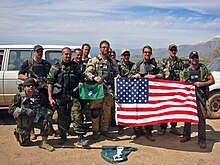Islamic Emirate of Byara
Islamic Emirate of Byara میرنشینی ئیسلامی بیارە | |
|---|---|
| 2001-2003 | |
|
Flag | |
Salafism | |
| Demonym(s) | Byarayi |
| Government | Islamic emirate |
| Emir | |
• 2001–2003 | Mullah Krekar |
| Deputies | |
• 2001-2003 | Wirya Salih |
• 2001-2003 | Ali Bapir |
| History | |
• Established | September 2001 |
• Disestablished | March 30, 2003 |
| Currency | Iranian rial, Iraqi dinar (de facto) |
| Today part of | Iraqi Kurdistan |
The Islamic Emirate of Byara (Kurdish: میرنشینی ئیسلامیی بیارە) was a short-lived unrecognized Kurdish Islamic state located in the Halabja Governorate ruled by sharia law which declared independence from Iraq in 2001. It collapsed after the United States launched Operation Viking Hammer.
History
Foundation
In September 2001, in the Byara District, located in the Avroman region, a Kurdish Salafist group called Ansar al-Islam, along with the Kurdistan Islamic Group and Kurdistan Islamic Movement, set up the Islamic Emirate of Byara, with the city of Byara as its capital. Mullah Krekar, leader of Ansar al-Islam, was the Emir of the Emirate, while Wirya Salih and Ali Bapir were his deputies. The emirate was the first time that Kurdish-Islamic nationalists succeeded at their goal, establishing a Kurdish state under Sharia. With the area under a de facto embargo from all sides, Kurdish jihadists from Iran gave vital cross-border support to the Emirate, setting up networks that illegally smuggled to the area.[1][2][3][4][5]
Life under the Islamic Emirate
Collapse

The Emirate ended after the United States launched Operation Viking Hammer in 2003. After the loss of the Emirate, Ansar fighters gathered at the Iran–Iraq border, where they were smuggled into Iran by Iranian Kurdish jihadists. The IRGC arrested many and sent them back to Iraqi Kurdistan to be arrested.[9] The KRG says that Iran also ignored many of them as long as the jihadists arrived secretly and quietly, and would be housed in remote areas. The IRGC allegedly warned Iranian Kurds who were housing jihadists that if they were seen publicly, they would be arrested and sent back to Iraq. Some Kurdish jihadists brought their families with them to Iran; some were detained by authorities for two brief weeks, and then were released and allowed to stay. Some jihadists settled in Iran, with others returning to Iraq, either joining the Iraqi insurgency, or going back to their ordinary lives and quitting the jihadist lifestyle.[1][2][3][10][11][12]
Aftermath
In late 2016, around the 15th anniversary of Byara,
See also
- Kurdish emirates
- Islamic Emirate of Kunar
- Islamic Emirate of Afghanistan (1996–2001)
- Islamic Emirate of Rafah
References
- ^ a b "Komal should 'shed' Islamic label: party leader". www.rudaw.net. Retrieved 2023-02-20.
- ^ a b "How ISIS Infiltrated Iranian Kurdistan". iranwire.com.
- ^ a b c "Journey to jihad: Iran's Sunni Kurds fighting a holy war in Idlib". www.rudaw.net. Retrieved 2023-02-20.
- ^ "Iraqi political groupings and individuals". middleeastreference.org.uk. Archived from the original on 2007-03-05.
- ^ Ram, Sunil (April 2003). "The Enemy of My Enemy: The odd link between Ansar al-Islam, Iraq and Iran" (PDF). The Canadian Institute of Strategic Studies. Archived from the original (PDF) on 30 March 2004. Retrieved 6 February 2015.
- ^ "Ansar al-Islam in Iraqi Kurdistan (Human Rights Watch Backgrounder, )". www.hrw.org.
- ^ "Ansar al-Islam in Iraqi Kurdistan". Human Rights Watch. Archived from the original on 2010-06-15. Retrieved 2014-01-22.
- JSTOR 26297412.
- ISSN 0882-7729. Retrieved 2023-11-13.
- ^ Masters of Chaos, Chapter 13 p. 7 Archived 2012-02-14 at the Wayback Machine
- ^ John Pike. "Ansar al Islam (Supporters of Islam)". Retrieved 20 March 2015.
- ^ "Radical Islam in Iraqi Kurdistan: The Mouse that Roared?". International Crisis Group. 2014-02-07. Archived from the original on 2011-11-21. Retrieved 2014-01-22.
- ^ Mahmud Yasin Kurdi (29 September 2016). "Time has come to break from Iraq, says radical Kurdish cleric Mulla Krekar". rudaw.net. Archived from the original on 29 November 2016. Retrieved 28 November 2016.

